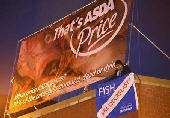EUROPEAN CETACEAN BYCATCH CAMPAIGN
"Man is but a strand in the complex web of life"
"Man is but a strand in the complex web of life"
Greenpeace occupation forces dramatic ASDA fish turnaround
Greepeace
17th January 2006
Supermarket chain ASDA is to make a dramatic improvement in its seafood policy after Greenpeace volunteers occupied the roof of its Leeds HQ.
The volunteers unfurled a banner with the ASDA logo and catchphrase 'That's ASDA price' against a backdrop of mutilated and wasted fish caught as bycatch by bottom-
Asda recently came rock bottom in a Greenpeace league table ranking supermarkets by their seafood policies. Scoring just one point out of twenty, Asda was found to be selling at least thirteen species on Greenpeace's 'danger list'.
However, in talks this morning Asda told Greenpeace that it would no longer be selling skate, Dover sole, ling and huss (dogfish) and is looking to remove marlin and swordfish from its shelves. The company is also devising a seafood policy that promises that they will now only buy fish from legal and sustainable sources that show responsibility for the environment.
Greenpeace campaigner Oliver Knowles said: "Until we scaled the roof of their HQ this morning, Asda were plunging the depths with their seafood policies. “ However, they've now made a substantial and very welcome turnaround, which will go some way towards helping to take the pressure off the perilous state of the oceans. "Now it's up to other supermarkets to act immediately and stop selling the most destructively fished species."
The world's oceans are in a state of crisis, and 90% of large predatory fish stocks like cod, tuna, swordfish and halibut have already been fished out. The UK retail market for seafood is worth £1.8 billion a year, and nearly 90% of sales are made through supermarkets.
Greenpeace is calling on all retailers to:
Immediately begin the process of removing the most destructively fished species from their shelves -
Increase the range of sustainable seafood they sell -
Work with suppliers to source fish from only the least depleted stocks, work with fishermen and / or researchers to improve sustainability of fishing methods and reject fish from fisheries and suppliers that refuse to change.
Improve seafood labelling by ensuring that all seafood products sold are clearly labelled so that consumers can make a more informed choice about the products they are buying. This means labelling seafood with: the common and scientific name of the species; the specific stock the seafood was caught from or the farm it was cultivated at; the fishing method used to catch it.
Notes
The league table marked supermarkets out of twenty across four categories:
1) number of the most destructively fished species sold
2) seafood procurement policies
3) support and promotion of sustainability initiatives
4) labelling policies and public promotion of sustainable seafood.
1) number of the most destructively fished species sold
2) seafood procurement policies
3) support and promotion of sustainability initiatives
4) labelling policies and public promotion of sustainable seafood.
The league table features in a report, 'A recipe for disaster'. The study reveals the effect fish markets are having on our seas. As well as ranking supermarkets it details how:
Three quarters of commercially valuable fish stocks are already fully exploited, overexploited or depleted. Worldwide up to 90% of stocks of predatory fish, including tuna, swordfish, cod and halibut, have already been fished out.
Wild caught fish are used for fishmeal and fish oil to feed farmed stocks like salmon. It takes about three tonnes of wild fish to produce one tonne of salmon. Furthermore disease spreads easily from farmed to wild populations, further depleting wild stocks.
Industrial fishing for smaller fish such as sandeels and anchovy for use in fishmeal has caused massive disruption to marine food webs and has almost certainly led to the decline in species such as cod, seals and seabirds in the North Sea.
Download the full report 'A recipe for disaster'.
For more information contact Jo Kuper on 07985 605 510 or the Greenpeace press office on 0207 865 8255
Top
